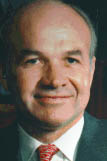
The Man Who Screwed the World
by David Morris
 |
by David Morris |
|
 Kenneth
Lay is living proof that one person can change the world. His company, Enron, may be in shambles. In three months, it may no longer exist. But for the rest of our lives we will live in a world redesigned by Kenneth Lay.
Kenneth
Lay is living proof that one person can change the world. His company, Enron, may be in shambles. In three months, it may no longer exist. But for the rest of our lives we will live in a world redesigned by Kenneth Lay.
The story begins in 1985 with the merger of two struggling natural gas companies and the creation of Enron. Lay was its CEO. When oil prices plummeted and customers began shifting from gas to oil, pipeline companies burdened with long-term high-priced contracts with gas suppliers sustained significant losses. Lay advocated deregulating wholesale gas markets. Allow large customers to bypass local gas utilities and buy directly from suppliers. Pipelines would carry anyone's gas. To make his case, Lay later recalled, "I went directly to the FERC [Federal Energy Regulatory Commission] commissioners." FERC changed the rules. With deregulation came higher price volatility. To allow customers to hedge against such volatility, Enron launched perhaps its major innovation -- making natural gas as tradable a commodity as pork bellies. Since one third of natural gas goes to power plants and Enron supplied natural gas, it inevitably wanted to move into electricity. That required deregulating wholesale electricity markets. Lay went directly to Congress. Congress changed the rules. In 1994 Enron began trading electricity as well as gas. By 1997 it had become the nation's largest electricity marketer, surpassing federal power agencies like BPA. Why was Lay so successful? The Economist magazine described Enron as an "evangelical cult," with Lay its "messiah." It didn't hurt that Lay was preaching the gospel of deregulation, a gospel widely shared by both political parties. And this missionary had clout. Lay had worked for FERC and was Deputy Undersecretary for energy matters for the Department of Interior. In the 1980s he became a principal fund raiser for President Bush and later his son. His board of directors included Wendy Gramm, wife of Senator Philip Gramm of Texas. A month after they left office, Enron put former Secretary of State James Baker and former Secretary of Commerce Robert Mossbacher on the Enron payroll. Lay golfed with President Clinton. "They have the clout and the ability to get the rules written their way," said Stephen Naeve, chief financial officer for Houston Industries, Inc. about Enron in 1997. "They play with sharp elbows." With wholesale markets deregulated, Lay began peddling the idea that every household should be able to buy directly from an electricity supplier. He is widely viewed as the key factor in convincing California to adopt retail electricity deregulation in 1996. With that accomplished, Enron launched a $25 million nationwide ad campaign to argue the merits of retail deregulation. Lay "deployed legislative SWAT teams in front line states such as New York, Massachusetts and Texas," Business Week reported in 1997. "It seems there's an Enron person everywhere," said S. William Manteria, VP of the National Retail Federation. Like topsy, Enron kept growing, creating global markets not only in gas and electricity but in pulp and paper and most recently, in Internet bandwidth. In the past two years Enron traders have handled more than $1 trillion in transactions. At its height Enron was America's seventh largest business, and its CEO, Jeffrey K. Skilling, could boast just one year ago, "There is a very reasonable chance that we will become the biggest corporation in the world." Now like a hurtling race car that hits a bump, Enron has crashed and burned. I leave it to Wall Street to do the financial post mortems. More interesting is the post mortem on energy deregulation itself. Kenneth Lay changed the world. But did he change it for the better? With his doctorate in economics, Lay undoubtedly will argue that he has improved efficiency. But now middlemen are everywhere in the energy system. A kilowatt hour of electricity can be bought and sold ten times between the time it is produced and the time it is consumed. As Wall Street has discovered to its chagrin, it is sometimes impossible to understand the transactions of a company like Enron. Deregulation has torn apart the tightly knit electricity system. Suppliers no longer are responsible for maintaining reliability. Partly as a result, transmission lines are overloaded. In the last l2 months California alone has lost some $50 billion largely as a result of deregulation. Enron's collapse represents a loss of $70 billion in debt and equity. In other words, Kenneth Lay turned a sleepy, even stodgy energy system (which, nevertheless, was the world's lowest cost and most reliable system) into a go-go, take-no-prisoners, wildly competitive landscape. The culture clash that ensued may best be exemplified by Enron's takeover of Portland General Electric (PGE). Before Enron bought the utility, three generations of the same family might have worked for PGE. "We're laid back, but we get the job done," PGE employee Scott Guptill told the trade magazine Electrical World. "We don't burn out." But Enron has. Last year Enron put PGE back on the market. The little utility no longer conformed to the Enron strategic plan. And this month many of PGE's life time workers have seen their life savings disappear as their 401(k) accounts, invested primarily in Enron stock, became worthless. Some would call that the price we pay for progress. What would Kenneth call it?
Albion Monitor
December 15, 2001 (http://www.monitor.net/monitor) All Rights Reserved. Contact rights@monitor.net for permission to use in any format. |